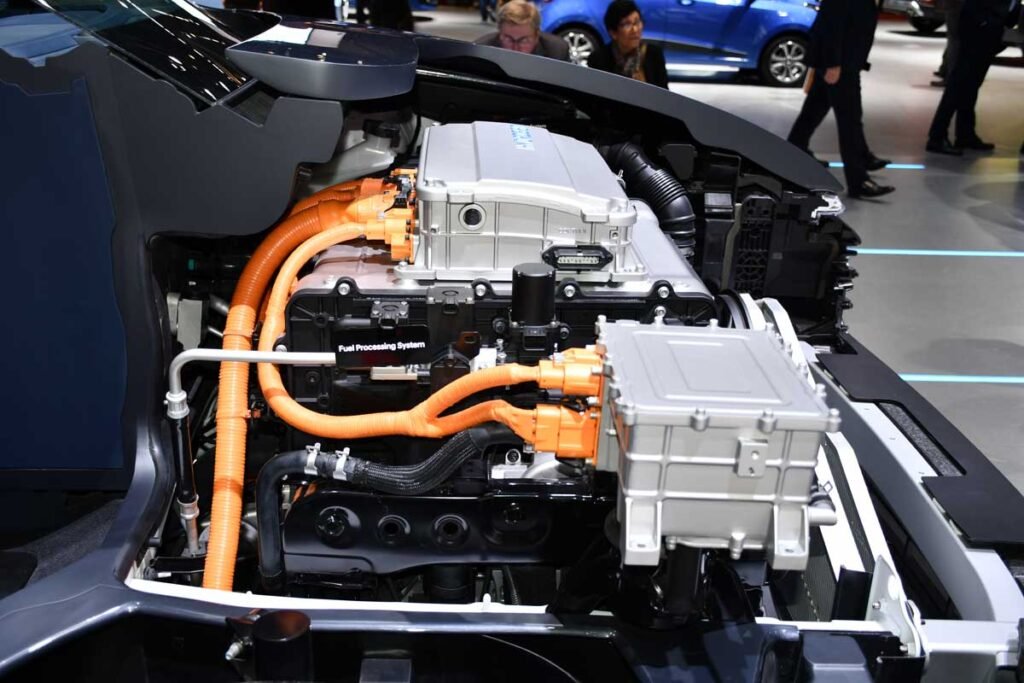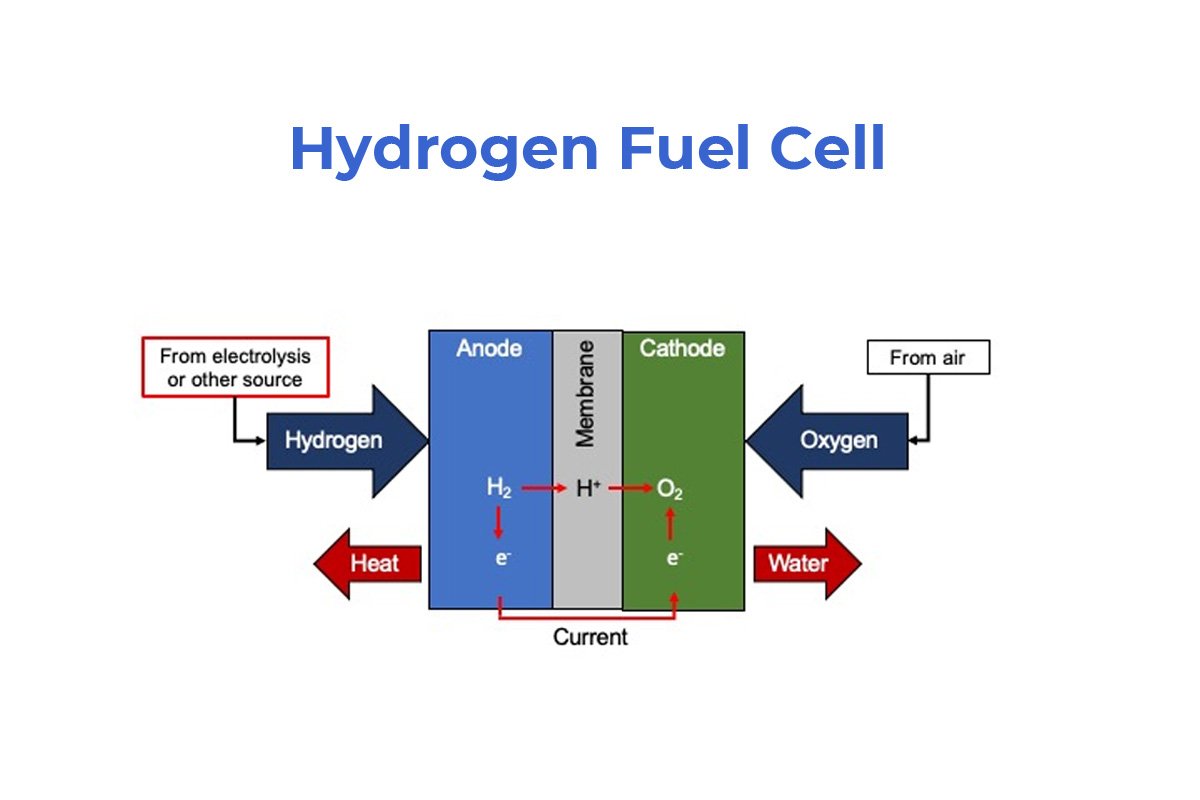Hydrogen Fuel Cell Vehicles are not that popular when compared to electric vehicles. But a decade back Electric cars were also not that popular when compared to Internal combustion engine cars. The first electric car was built centuries ago, and the first hydrogen Fuel Cell Vehicle was commercially launched in 2013. Though hydrogen fuel cell is present for decades now. I am not here to say electric cars are bad or hydrogen vehicles are better. I am just going to put forth points that can be discussed.
How Hydrogen Fuel Cell Vehicles works

Hydrogen fuel cell vehicles also have an electric motor like EVs, but instead of storing energy in the battery, the fuel cell generates electricity on the go. It generates electricity by combining hydrogen and oxygen. A hydrogen car has a hydrogen tank from which the hydrogen is passed onto the fuel cell, and the oxygen is sucked in through the air, just like an ICE car. The by-product of this is just water, hydrogen cars do not emit any harmful particles, it just emits water from the exhaust.
So how does a hydrogen car compares to an electric car? There are 3 major concerns when buying an electric car Range, Recharging, and Cost
Let’s talk about Range
This is one of the main concerns of the person when he/she is looking to buy an electric car. Electric cars today do not have a very high range, and the one that does requires large batteries and cost more, though the technology in the EVs is improving steadily and becoming more efficient.
The hydrogen fuel cell can produce more range without increasing the weight because hydrogen is more energy-dense. In the case of EVs, you need large batteries if you want to increase the range, which also means more weight. So you can increase the range of a hydrogen fuel cell mush efficiently when compared to EVs.
Now let’s talk about Recharging
This is another concern that bothers people when buying an electric car. We cannot fill the battery to 100% at a stop, just like we do with our ICE cars. Filling our ICE cars takes like 2-5 mins, in this time you can charge like 10-20% of your electric car if you have a fast DC charger.
This is not the case with hydrogen fuel cell vehicles, you can refuel the hydrogen just like refuelling your ICE car. But the cost for refuelling is higher than recharging your batteries.
Lastly, lets talk about the cost
The starting price of electric cars in India is around Rs 8-10 lakhs, and we do not have any hydrogen fuel cell vehicles in India. In the US the cheapest electric car cost around $30,000 and a hydrogen fuel cell vehicle cost around $50,000. Also, the refuelling hydrogen fuel cell vehicle is more expensive than EVs.
Problems with Hydrogen
Hydrogen is the most abandoned element in the entire universe, but it is always available with some other element, like HCL, H2O, NH3. To get hydrogen you have to extract it from these elements. There is 2 most common process, steam-methane reforming and electrolysis. And this extraction process consumes a lot of energy. Even after the extraction, you don’t get 100% hydrogen, you lose around 20-30%, so it is only 70-80% efficient.
After extraction, you have to store the hydrogen, which is another challenge, as hydrogen is very low in density. So either we can pressurize it or liquefy it. Both have issues and there is a loss of energy of around 13-40%.
The next challenge is to deliver the hydrogen to the hydrogen pumps, this can be solved by extracting hydrogen at the same place where the hydrogen pump is. But this can raise the cost of hydrogen because when extracted in small quantities hydrogen is expensive.
Because of the extraction process which is done through natural gas and coal, this process emits a lot of greenhouse gases, which is not exactly efficient, also expensive. So using hydrogen in cars is not technically beneficial over a battery-powered electric vehicle. Because we are not only emitting while producing the car but also emitting by refuelling. Also, the cost of refuelling is way higher than battery-powered electric vehicles and ICE cars.
So can hydrogen be beneficial and used widely?
Solutions
Yes, hydrogen can be more efficient and beneficial, but first, we need to use sustainable forms of energy to extract hydrogen. Also, we need to increase the efficiency of the hydrogen generated from the extraction process. We need to put in more research on these technologies.
A Belgium research team used a solar panel to generate hydrogen from the sunlight and water vapour present in the air. This solar panel can produce 250 litres of hydrogen per day. They say with 20 of these solar panels a home can power its electricity and heating needs for a year. Read more here.
Hyundai has invested $400 billion in converting plastic waste to hydrogen. This plant aims to convert 100,000 tons of plastic into 22000 tons of hydrogen which would be enough to power 150,00 hydrogen fuel vehicles that can run for 14000 KM each. Read more here.
We need this kind of technological advancements that can be scalable to daily use. A lot of research and technological advancement is done in battery-powered vehicles because we believe that is the future, but we do more research on that also. Also, we are charging our EVs with current coal-powered electricity which is also not good.
Rather than using hydrogen for personal vehicles, they can be used in vehicles like trucks and buses and planes, that run for long distances. As we can increase the range of hydrogen fuel cell vehicles without increasing the weight. It can also be used in heavy industries. Because hydrogen is more energy-dense.
Conclusion
So no matter what energy form we use, lithium-ion battery or hydrogen fuel, we need more research and technological advancement that can make these options more efficient and reduce greenhouse gases from our atmosphere. Hydrogen fuel cell vehicles are new compared to Battery-powered vehicles, but I believe hydrogen fuel cell vehicles have good potential if we do more research and make them a viable product just like we did with battery-powered electric vehicles.
Also, one more problem with battery-powered EVs the material used in lithium-ion batteries like lithium and cobalt are not easily available when compared to hydrogen. So if we make the extraction process of hydrogen more efficient this can be a better option in the future.



